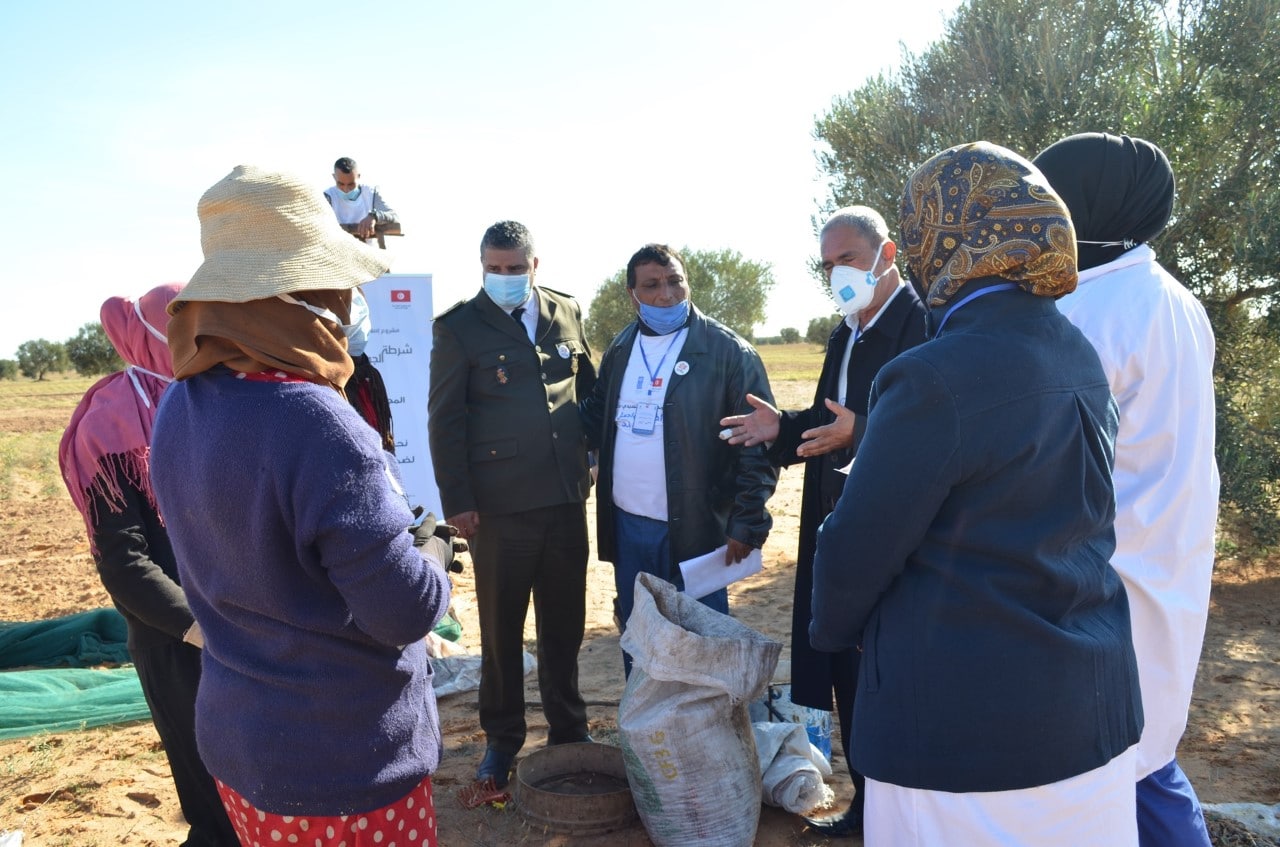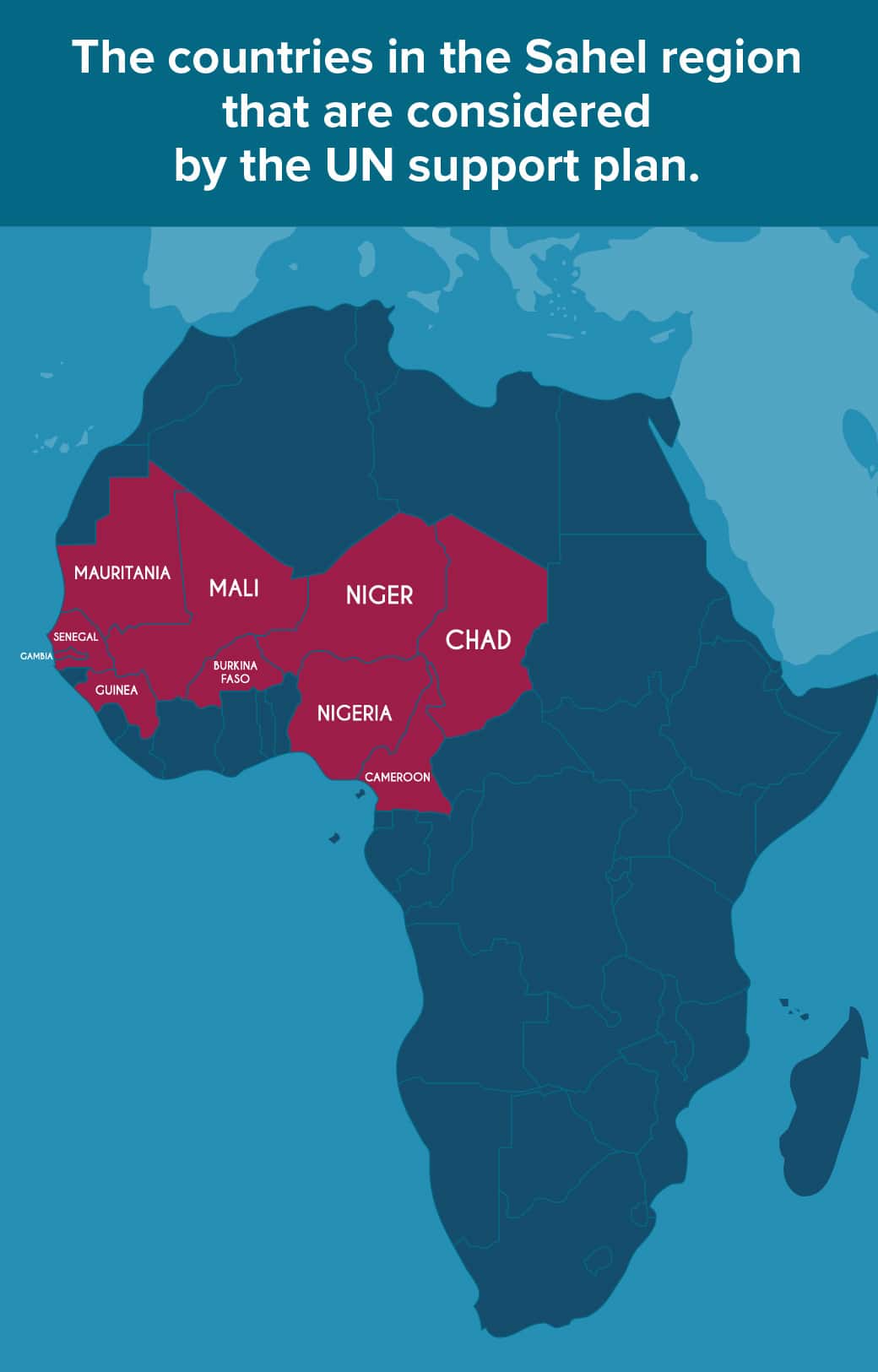Focus
Community Security
In 2020, security all over the world confronted unprecedented challenge. While security forces have played an important role during the pandemic, enforcing emergency measures was too often accompanied by the use of excessive force, abuse of power and discriminatory actions. Interventions by security forces have become even more critical and controversial in conflict and fragile contexts, where community tensions are prevalent, and the legitimacy of the government can be contested with resistance to the emergency orders.
UNDP support to security focused on reinforcing the safety of law enforcement and developing their capacities including on human rights compliance in Angola, Kyrgyzstan, Lebanon, Pakistan, Zambia, Zimbabwe and Kosovo*, and on the fight against gender-based violence (GBV) and protection of women and children in China, Pakistan, Peru, and State of Palestine. UNDP looked at the influence of the security forces in the COVID-19 response and recovery offer, specifically through linkages between security and stabilization, based on the new paradigm of civil-military coordination creating a conducive environment for humanitarian and development interventions.

UNDP has supported Kosovo* Police K- 9 Unit by expanding its capacities in detecting illicit arms. Irzeme Ferati, a female police officer in Kosovo, a K9 dog trainer. © UNDP Kosovo
*References to Kosovo shall be understood to be in the context of Security Council resolution 1244 (1999)
In 2020, a people-centered approach to security was further rooted in UNDP’s programming response. This people centered approach has also been recommended in the UN guidance note on the rule-of-law-based public security during the COVID-19 emergency. For this, UNDP partnered with Sweden’s Folke Bernadotte Academy on a “Thought Paper on People-centred approach to Security”. An Advisory Group on people-centred approach to security composed of 10 UN and 10 non-UN international organizations, think tanks and academia, was established to discuss and jointly define the most important concepts related to human security. Its implementation, however, is still challenging, not only for UNDP, but for all national and international actors – all working together to accelerate the progress on SDG16+.
* References to Kosovo shall be understood to be in the context of Security Council resolution 1244 (1999)
Disarmament, Demobilization and Reintegration (DDR) – Prosecution, Rehabilitation and Reintegration
Security risks emerge when combatants, fighters and persons formerly associated with armed forces and groups are left without livelihoods and support networks. Families and communities also need to be prepared to receive these people back, in ways that will promote reconciliation and minimize stigmatization. Ultimately, it is key to prevent re-recruitment by other armed groups, criminal networks and even terrorist organizations.
UNDP prioritizes community-based approaches to sustain peace and achieve justice for victims, by supporting families and communities of return, restoring social relations, promoting reconciliation, and avoiding perceptions of inequitable access to resources. Reintegration support can help address some of the structural issues that create or fuel the risks of conflict escalation and recurrence, such as marginalization and inequalities. In a nutshell, the reintegration of ex-combatants, ex-fighters and persons formerly associated with armed forces or groups contributes to the achievement of the Sustainable Development Goals (SDGs): significantly reducing armed violence and death rates, reducing arms flows, freeing trafficked women and child soldiers from armed groups.
UNDP’s Co-Chair of Inter-Agency Working Group on DDR (IAWG) is key in providing a development perspective on reintegration, a critical and difficult part of Disarmament, Demobilization and Reintegration (DDR), which is intimately linked to community stabilization, recovery and development during and in the aftermath of conflict. The IAWG is the custodian of the Integrated, Disarmament, Demobilization and Reintegration Standards (IDDRS).
UNDP is also engaged, with partners, in supporting reintegration through integrated approaches beyond dedicated DDR, e.g. following downsizing security forces; within community violence reduction (dealing with gangs); transitional justice/amnesty processes; and as an integral part of prosecution, rehabilitation and reintegration requirements for terrorist groups.
The concept of ‘Prosecution, Rehabilitation and Reintegration’ (PRR) has more recently emerged as a UN Security Council requirement along with the obligation “to bring terrorists to justice”. It reflects the need to “screen and prosecute, rehabilitate and reintegrate” those members of fighting forces which have been designated as “terrorist” groups and find solutions for their families. UNDP has supported reintegration as part of PRR strategies in Cameroun, Chad, Niger, Nigeria (Boko Haram), in the Lake Chad Basin through the formulation of the Lake Chad Basin Commission (LCBC) Community-Based Reconciliation and Reintegration Policy and in the Middle East through the report Pathways to Reintegration in Iraq and the formulation of a programme.

An awareness campaign on the prevention of violence against women in the rural region of Sidi Makhlouf in southern Tunisia. The campaign is a part of the Security Sector Reform project and community policing approach implemented by UNDP Tunisia and the Tunisian MoI. ©️ UNDP Tunisia/Local Security Committee of Sidi Makhlouf

Security Aspects of Stabilization in the Sahel region
Despite increased international support, the security situation in many Sahelian countries has been continuously deteriorating in recent years with the expansion of the main hotspots of violent extremist groups in the region. While regional forces have been mobilized to support affected contexts with increased military expenditure (e.g. from Burkina Faso, Cameroon or Niger), the number of violent attacks and incidents has steadily increased. The vicious spiral of violence has been intensifying over the last four years with both Sahelian security forces and local armed groups committing numerous abuses against civilians, driving more recruits into extremists’ arms.
At the same time, the region’s governments have focused on military and security responses rather than a holistic and integrated approach to address the root causes of the violence, including governance challenges. Therefore, UNDP, in cooperation with Germany and other partners, has been supporting Sahelian governments in achieving their development goals.
Via the Lake Chad Regional Stabilization Facility, UNDP has been supporting the implementation of the Regional Strategy for the Stabilization, Recovery and Resilience of the Boko Haram-affected areas of the Lake Chad Basin in Nigeria, Niger, Chad and Cameroon. The facility serves as a rapid response mechanism to support the local authorities by restoring and extending effective civilian security, improving the delivery of basic services, and providing employment opportunities for local populations in the region. Further, UNDP is implementing the Liptako – Gourma Regional Stabilization facility, which aims to extend state authority and deliver peace dividends through three main stabilization pillars: 1) rehabilitation of essential infrastructures and basic services; 2) improvement of physical security and access to justice and 3) revitalization of the local economy.
Moreover, in 2020, UNDP partnered with Germany to undertake an in-depth analysis of the security situation and the institutional and legal frameworks governing security and the rule of law in five Sahelian Countries, which concluded with the drafting of the Sahel Security and Stability Assessment Regional Report. As an outcome of the Assessment, the German Foreign Office contributed €20 million to UNDP’s social cohesion, security and rule of law (COSED) programme in Burkina Faso. Country specific analysis will be conducted for other countries, including Mali and Niger.
SALIENT: Saving Lives Entity
The Saving Lives Entity (SALIENT) is a new United Nations funding facility, which is dedicated to supporting Member States in tackling armed violence and illicit small arms and light weapons as part of a comprehensive approach to sustainable security and development. Informed by more than twenty years of experience on small arms control and armed violence prevention by the United Nations Office of Disarmament Affairs (UNODA) and UNDP, SALIENT offers the international community a new vehicle for sustained financing of small arms control measures in settings that have been most affected. By supporting catalytic activities to mainstream small arms control in both development and security efforts, SALIENT responds to the multi-faceted nature of the illicit proliferation of small arms and light weapons, and addresses root causes of armed violence. Current supporters of SALIENT are: France, Germany, Japan, New Zealand, Sweden and Switzerland.
Established in partnership with UNODA and the Peace-Building Support Office, SALIENT is designed to support both UN and non-UN partners to prioritize national ownership and to foster collaboration on comprehensive approaches to small arms control as well as open new doors for sustainable financing. Proposals for funding are developed by at least two UN entities jointly with the host government and in coordination with the Resident Coordinator’s Office.
In contrast to traditional project-based approaches, SALIENT is intended to be the common framework through which the UN addresses armed violence and small arms and light weapons issues on the ground. It will enable affected states to tackle small arms issues through innovative, integrated, multi-dimensional programmes and as part of wider development plans.
SALIENT was approved in December 2020, with three pilot projects in Cameroon, Jamaica and South Sudan, currently in the scoping and design stage.
